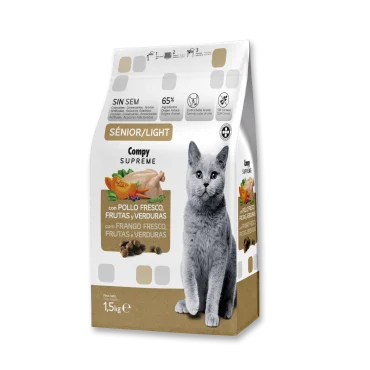Chicken 45% (fresh chicken* 26%, dehydrated chicken protein 19%), pea starch*, peas*, poultry fat* (3.5%, source of omega-6 fatty acids), dehydrated animal proteins, hydrolysed animal proteins, fish oil* (0.5%, source of omega-3 fatty acids), vegetable fibres (1.5%), fructooligosaccharides* (0.3%), mineral substances, dehydrated spinach* (0.01%), dehydrated pumpkin* (0.01%), dehydrated carrot* (0.01%), yeast walls* (600mg/kg, source of MOS), Yucca schidigera* (300mg/kg), dehydrated forest fruits* (0.01%) (cranberries*, blueberries*, blackberries*, raspberries*, currants*), glucosamine, chondroitin sulphate. *Natural ingredients.
The feeding table indicates the total daily amount to be given to adult cats based on their body weight, physiological state, activity level and environmental conditions.
| Adult cat weight (kg) | Daily ration (g) |
|---|---|
| 23 | 35 - 45 |
| 3 - 4 | 45 - 55 |
| 4 - 5 | 55 - 60 |
| 5 - 6 | 60 - 70 |
| + of 6 | 70 - 75 |
Number of daily meals: We recommend leaving the food freely available, as long as the animal knows how to ration it. Otherwise, we recommend dividing the food into 2-3 meals and establishing a schedule for meals. Place the recommended daily amount in your cat's food bowl without mixing it with other products, unless changing the diet. Do not wet the kibble as its normal consistency helps preserve your cat's teeth.
Change of diet
Cats are very sensitive to changes in diet, and may reject the new food and even cause diarrhea or vomiting if the change is made abruptly. Therefore, when changing from one product to another, remember that you should gradually reduce their current diet and add the new food over a period of 1 week, until it becomes their exclusive diet.

